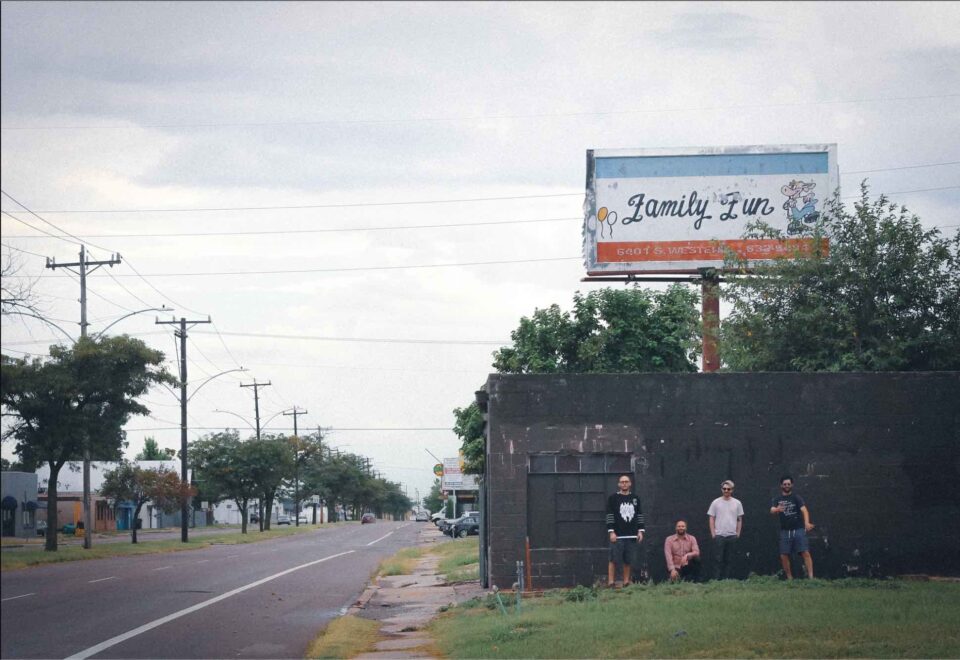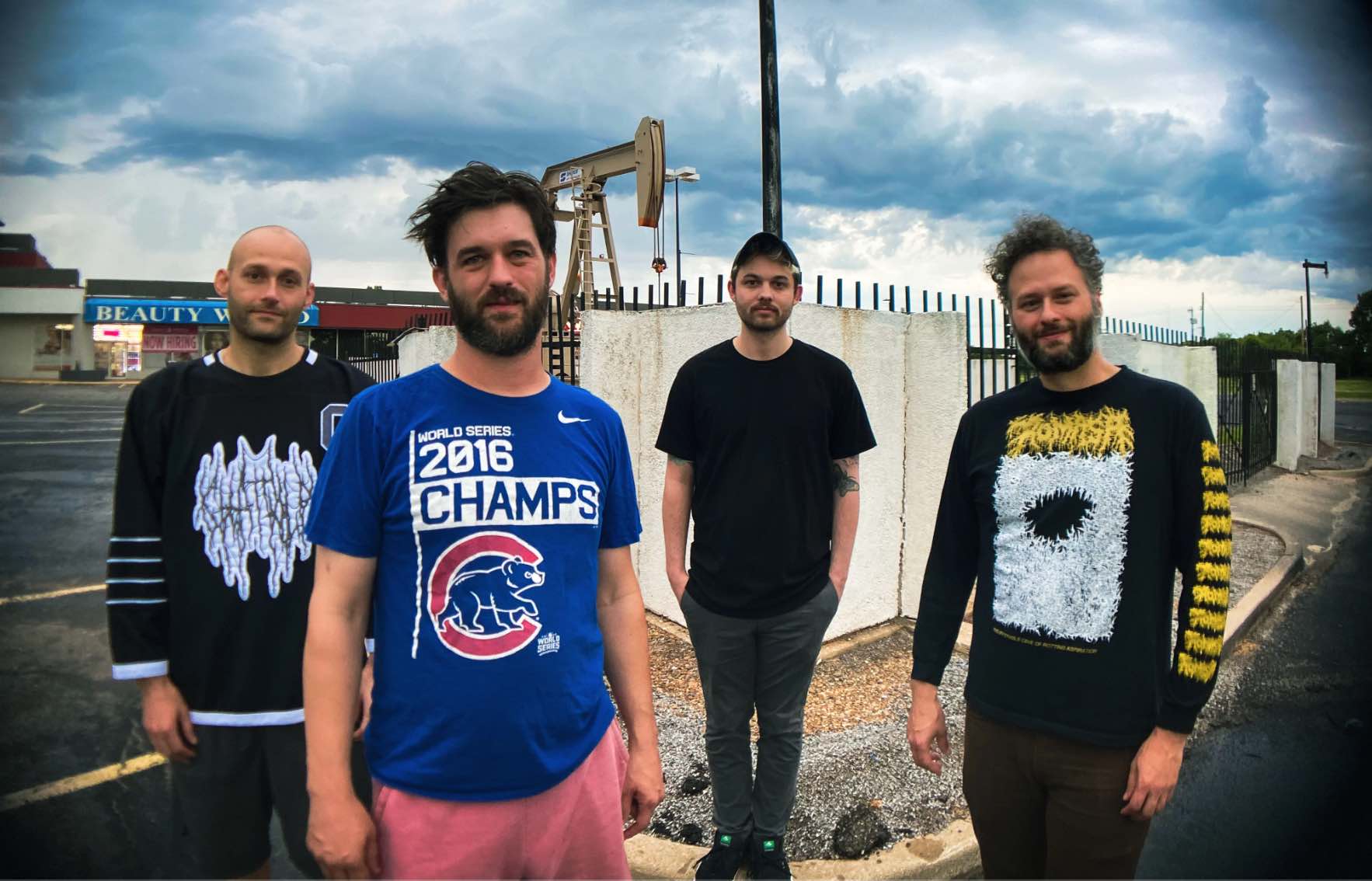“One of our key inspirations is the commercial music for Beavis and Butt-Head—we talked about that a lot at the beginning of Chat Pile,” Raygun Busch tells me, his deep drawl immediately familiar as the voice that occupies the skin-crawly, spoken-word-over-unexplained-scratching-sounds penultimate track on the Oklahoma City group’s debut album God’s Country. With this offhand comment he captures an aspect of the band that gets lost in its frequent comparisons to ’90s noise-rock acts like Helmet and The Jesus Lizard over the years: the distinct groupthink that collectively lands on track names like that of the chilling eight-minute album closer “grimace_smoking_weed.jpeg,” which is very nearly a 30 Rock bit come to horrifying life.
Rounded out by bassist Stin, drummer Captain Ron, and guitarist Luther Manhole—the first two join our conference call, while Manhole alleges over a text to Stin that www.freeconference.com requires payment for his participation—Chat Pile definitely is a hard band to describe. There’s something of Converge’s freaked-out screams to Busch’s more erratic vocal performances, though the group most commonly sounds like the Hyde to (regular) Pile’s Jekyll, their sound doomy and deranged and warped by the nearby toxic refuge heap that graces the band with another layer to the “sludge” descriptor they’ve earned (not to mention inspiring their name). It may be more helpful to describe the feeling the band evokes, which reminds me of the Satanic Southern Gothic of the first season of True Detective by way of the lotion application pit in Buffalo Bill’s basement. It sounds like the hellish flipside to the glossy, idealized version of Bible-Belt hedonism espoused by Ethel Cain earlier this year. It’s like “a kind of darkness you never get used to,” to use the band’s own lyrics, or “the sound of the world collapsing.”
“People peg us for being this super nihilistic band. We definitely talk about dark things, but it’s not in an, ‘Oh, fuck it, let’s watch the world burn’ type of way.”
— Captain Ron
Yet if this is the nihilistic world evoked on God’s Country’s first track and lead single “Slaughterhouse”—and by the band’s sonic reference points, maybe barring Mike Judge—track two and second single “Why” grounds this erratic rage as a completely justified and surprisingly coherent anger at this country’s ever-worsening housing situation—a progressively political attitude that actually weaves through the entire album, whether or not that’s always immediately apparent. “It’s weird because people peg us for being this super nihilistic band,” Captain Ron says. “We definitely talk about dark things, but it’s not in an, ‘Oh, fuck it, let’s watch the world burn’ type of way. It’s more like, ‘We wish things were better, and we see a path for things to be better, but we’re not going down that path.’”
“We kind of found that there’s a small segment of our fanbase that maybe hasn’t gotten the more in-between-the-lines political messages that we’re trying to make in other songs,” adds Stin. “So when ‘Why’ came out, and they realized where we stand in a very blunt way, politically, they didn’t care for it. Most people loved it, but there was definitely a segment that was like, ‘Oh, I thought these guys were psychopaths, and that’s what I want.’ And that’s just not who we are.” (“We’re just normal dudes,” he reiterates later as the conversation takes a turn toward the trappings of a project like this potentially summoning a cult-like following, before shifting the statement into something of a PSA to their fans: “Please take care of yourself.”)

Busch also seems unapologetic about that track’s bluntness. “This is just pissing me off—everyday going to work and seeing these people living under a bridge and shit, right next to this, like, five-star hotel getting built down the road. I hate fucking lack of compasion, and you see that a lot. Everyone lacks compassion these days, it seems like.”
When seeking out a label home for God’s Country, one of the band’s biggest concerns was political alignment, something The Flenser was not only able to offer but a quality they in turn seemed to require from their signees. “When we sat down and talked to [label manager Jonathan Tuite], we had some very pointed political questions we asked just to make sure we weren’t dealing with anybody that we shouldn’t,” Stin explains. “And he did his due diligence on us, too, to be fair,” adds Busch. “He asked us some questions, like, ‘You guy don’t have any horrible secrets, do you?’” It seemed like a perfect match, with much of the label’s diverse roster covering similar lyrical ground in terms of topics like mental health. “I think Have a Nice Life, even though their work is about depression, it’s sort of about overcoming depression, or living with depression. It’s not really like…‘Go ahead and kill yourself,’” Busch laguhs.
“There was definitely a segment [of our fanbase] that was like, ‘Oh, I thought these guys were psychopaths, and that’s what I want.’ And that’s just not who we are.”
— Stin
In spite of the track’s evident blind terror, “Slaughterhouse” introduces the album’s personal and political themes by drawing parallels between killing factories and the various ways in which this country steers its citizens to bleed out for the sake of profit, while later on the album “The Mask” invokes a scene of a bank robbery with lines like “It didn’t have to be this way” eminating shades of yet another chiding email from our Speaker of the House of Representatives soliciting donations with a why-are-you-hitting-yourself reprimanding tone. While there’s probably enough dots to connect here that you could call it a concept album, Busch adds a caveat: “We’re not telling a story like Tommy or some shit, but it’s a concept album, I guess, in the way The Who Sell Out is, where it’s based on a theme.” He also clarifies that the band veered away from diving too far into explicitly dealing in political issues: “We certainly don’t want to look like a ‘Not My President’ shirt in 2022, you know what I mean?”
One of the more specific themes the album takes on is the everyday evils witnessed in their hometown of Oklahoma City, with the imagery of the city’s hideous jail working against the words “God’s Country” scrawled across the album’s cover. “Oklahoma actually has one of the highest incarceration rates in America, and that particular jail is one of the most deadly jails in the entire nation,” Stin informs me. “And it is smack dab in the middle of our downtown. So if you do anything downtown—which we all live within a mile of—you drive by these structures that are so aesthetically unpleasing, but then even beyond that, they’re not hiding the evil that’s within it. It’s almost nakedly evil—you look at it and you feel chills.”
“And a lot of people around here celebrate that shit in their own way, you know?” Busch adds, broadening the conversation to include this wider net of topics where the popular opinion in this country is bafflingly inane. “A lot of people around Oklahoma, if you say ‘I hate cops,’ will look at you like, ‘Oh my god, you just said something blasphemous,’” he adds, while Stin points out how even such arbitrary topics as sidewalks—a luxury which, the band notes, is scant in OKC—have become partisan issues. “Who doesn’t want their city to be walkable and have trees in it?” he earnestly asks, perhaps inadvertently inspiring a spiritual sequel to “Why” for the next Chat Pile album.
“We certainly don’t want to look like a ‘Not My President’ shirt in 2022, you know what I mean?”
— Raygun Busch
“That’s kind of one of the reasons you see fast food and strip malls and that kind of shit show up a lot in our lyrics and the artwork,” Ron adds. “It all comes down to that, like, American ugliness. And it’s all we have as an identity, our consumption habits.” That comment takes us back to the image—or image file—of the aforementioned lovable McDonaldland figure blasting tree on the cryptic, extensive closer to God’s Country, a track which Busch describes as more of a “short story” than an integral part of the album’s central plot as he invokes Walt Whitman to get across just how zoomed in his lens was when writing this particular track.
“If you wanted to do a deep read on that, you could say Grimace is the American government,” he concedes. “Or living in America turned out these sick little boys who are monsters, who are purple men. I’m purple, too.” FL







